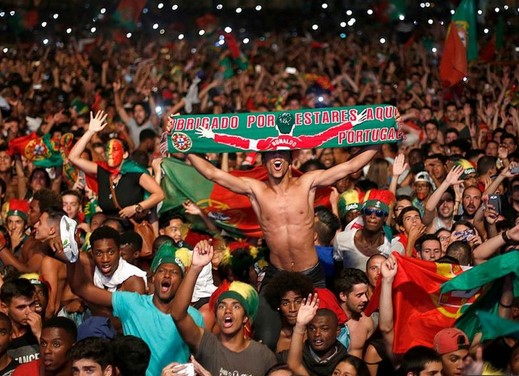 Portugal, a nation of mesmerizing landscapes, rich heritage and literary geniuses, had another chapter of its tale riding on the shoulders of 11 men in the summer of 2016. Were the great Fernando Pessoa still alive, he surely would have dedicated significant time to depicting the achievement in equally memorable words.
Portugal, a nation of mesmerizing landscapes, rich heritage and literary geniuses, had another chapter of its tale riding on the shoulders of 11 men in the summer of 2016. Were the great Fernando Pessoa still alive, he surely would have dedicated significant time to depicting the achievement in equally memorable words.
The streets of Lisbon were awash in a sea of red and green. Families, friends, and strangers gathered together, the air buzzing with anticipation. Murmurs of the past, coupled with hopes for the future, coalesced into a single heartbeat, Portugal’s passionate cry for victory.
Rising from shadows: the unexpected journey
You’d be forgiven if you initially pegged Portugal as mere participants at Euro 2016. Perpetual entertainers but not held up as serious contenders for overall victory, their group stage performance did little to shift this perception, displaying a quixotic symphony of resilience and fragility, skill and naivety, dancing between draws and narrow wins. Their route to the finale was marred with intense drama, leaving fans at the edge of their seats. Unheralded players like Cédric Soares, José Fonte and supposedly “past-it” performers like Nani and Quaresma didn’t just play; they embodied the spirit of a nation craving success. Against the backdrop of towering favourites in the form of Spain, Italy, France, Germany and others, Portugal carved a path to the top, overcoming overwhelming odds.
Ronaldo’s star-crossed evening
On 10 July 2016 the stage was set at Stade de France, Paris, the strategies laid out, and the world watched as two footballing titans clashed. Portugal’s talisman, Cristiano Ronaldo, began with his typical swagger, always a threat. But then, a gasp echoed worldwide. A robust clash, a grimace, and the sight of Ronaldo on the ground. Every heart that beat for Portugal felt the weight of the moment, a convergence of anxiety and uncertainty.
Amidst this turmoil, a peculiar shift occurred. As the news of Ronaldo’s injury spread like wildfire, betting offers were swiftly recalibrated, with many believing Portugal’s hopes had been dented significantly. But little did they know...
A phoenix rising: Portugal’s resilience comes to the fore
Football, in its essence, isn’t about a single player. It’s about the collective. Portugal’s response to Ronaldo’s departure was nothing short of poetic. With the weight of their icon gone, other protagonists like Pepe, Adrien Silva and swashbuckling youngsters Renato Sanches and Raphaël Guerreiro rose to the occasion, stitching passes and making interceptions with newfound vigour.
Gignac’s shot against the post in the 93rd minute might’ve spelled doom for any other team, but not this Portugal. They embraced luck with grace, a silent nod to football’s fickle nature. And then, in a move that stunned naysayers and fans alike, Eder, an unassuming figure for most of the tournament, unleashed a shot that would find itself etched in history. The net rippled, the stadium roared, and Portugal had risen from the ashes.
The morning after: Portugal’s new dawn
The final whistle didn’t just signify a match’s end but the birth of legends. Those streets of Lisbon? They erupted in ecstatic celebration. Kids draped in flags, adults with tears of joy. This wasn’t just a football win, it was a national embrace of destiny.
Portugal’s triumph wasn’t just about a trophy, it was a testament to perseverance. The accolades poured in. Eder’s strike was replayed on loop, coaches and players became national heroes, and the world had to acknowledge the might of the Portuguese spirit.
This win, against all odds, is now a beacon in the annals of Portuguese football, reminding every budding player and every sceptic that with passion, belief, and unity, even the unthinkable is attainable.

